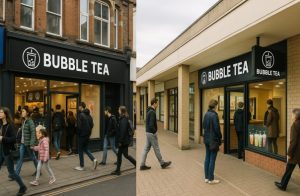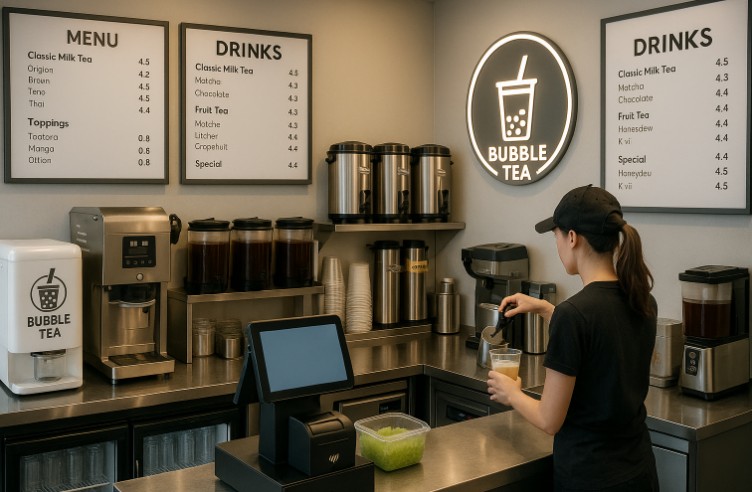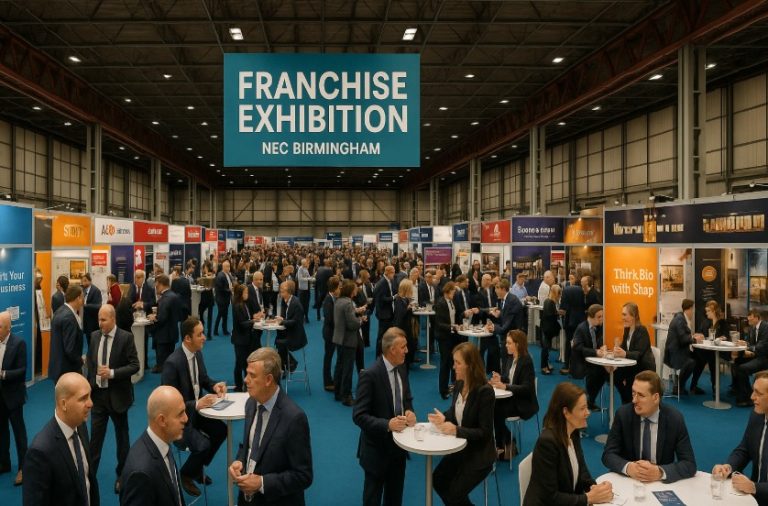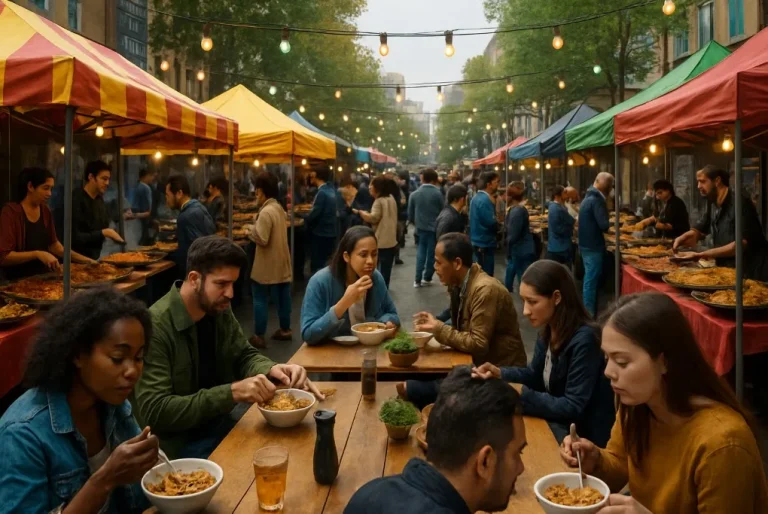The bubble tea market in the UK has seen rapid growth in recent years, with major brands expanding across cities and towns to meet the ever-growing demand for this popular drink.
For aspiring entrepreneurs, investing in a bubble tea franchise offers an exciting opportunity however, understanding the full financial picture is crucial.
This guide provides a comprehensive breakdown of bubble tea franchise costs in the UK, from initial fees to long-term expenses.
What Is the Average Bubble Tea Franchise Cost in the UK?

In the UK, the typical bubble tea franchise cost can range from £10,000 to over £150,000. This variation depends on several key factors, including the size of the operation, location, and brand value.
Franchisees who opt for smaller kiosk formats may be able to start with an investment of around £20,000 to £50,000. On the other hand, those pursuing a full-sized store within a high-traffic location could require an investment that exceeds £100,000.
The cost is influenced by the complexity of the setup, staffing needs, and ongoing operational support from the franchisor.
The type of franchise also impacts the cost. Larger, well-known brands with national or international reach typically demand higher fees due to their built-in customer base and comprehensive support systems.
In contrast, emerging or lesser-known brands may require lower startup capital but may come with limited resources.
How Much Are Initial Franchise Fees for a Bubble Tea Business?
Initial franchise fees are the upfront payments made to secure the rights to operate under a franchisor’s brand name. These fees are standard across the industry and generally fall within the range of £10,000 to £40,000.
The exact amount depends on the strength of the brand, level of support offered, and geographic exclusivity.
This fee usually covers:
- The licence to use the brand name and intellectual property
- Initial training for franchisees and their staff
- Access to operational manuals and marketing resources
- Initial product supply or stock packages
Popular UK and international brands have varying franchise fees. For example, CUPP Bubble Tea charges a flat franchise fee of £20,000, while Mooboo incorporates its fees into an overall minimum investment of £39,950. Gong Cha, operating globally, typically has higher franchise fees due to its brand value.
What Does the Total Initial Investment Include?
Total initial investment refers to all the capital needed to launch the franchise and begin operations.
It includes the franchise fee but also several other startup-related costs that are crucial for establishing a functioning bubble tea shop or kiosk.
The investment generally covers:
- Shopfitting and design work
- Equipment purchase (sealing machines, blenders, refrigeration units)
- Initial inventory (tapioca pearls, teas, cups, straws, syrups)
- Marketing and signage for the launch
- IT and POS system setup
- Insurance and business registration
- Legal and professional advice
- Rent deposit or lease acquisition
Below is a comparative table highlighting estimated costs for popular bubble tea franchises in the UK:
| Item | Estimated Range |
| Franchise Fee | £10,000 – £40,000 |
| Equipment & Setup | £15,000 – £50,000 |
| Inventory (First Stock) | £5,000 – £10,000 |
| Lease/Rent (Initial Period) | £10,000 – £30,000 |
| Launch Marketing | £2,000 – £5,000 |
| Legal and Consultancy Fees | £1,000 – £3,000 |
| Total Investment Range | £40,000 – £150,000 |
Costs vary greatly based on location size and brand requirements. A city-centre store will incur higher property and setup costs than a suburban kiosk.
What Are the Ongoing Franchise Costs to Expect?

Once the initial setup is complete, a bubble tea franchise continues to incur a range of regular costs that must be factored into your financial planning. These ongoing expenses are critical to the daily operation of the business and can significantly affect profitability if not properly managed. Understanding these recurring obligations helps franchisees maintain control over their margins and ensure long-term sustainability.
Royalty Fees
One of the most common ongoing costs in any franchise business model is the royalty fee. This is a percentage of the franchisee’s gross revenue paid to the franchisor, typically on a monthly basis. In the bubble tea industry, royalty fees generally range between 4% and 10% of gross turnover, though some brands may apply a fixed monthly fee instead.
These fees are paid in exchange for continued access to the franchisor’s branding, supply chains, operational tools, marketing assets, and business support. While they reduce your take-home profits, they are also a vital part of the franchising ecosystem, as they help maintain the brand’s consistency and growth across all locations.
For example:
- A shop earning £20,000 per month with an 8% royalty would pay £1,600 monthly to the franchisor.
- Some franchisors cap royalties during initial months to ease the burden on new outlets.
Marketing and Advertising Contributions
Franchisors often require franchisees to contribute to a centralised marketing fund. These marketing contributions usually range from 1% to 5% of monthly sales, depending on the franchise agreement. The funds are typically used for:
- National and regional advertising campaigns
- Digital marketing (e.g., SEO, PPC, social media)
- Seasonal promotions and brand awareness initiatives
- Graphic design, printed materials, and branded packaging
While these contributions are mandatory in most agreements, many franchisors also allow franchisees to conduct local marketing within brand guidelines to promote store-specific offers or events.
Inventory and Supply Costs
Bubble tea shops rely heavily on consistent stock replenishment. This includes raw materials such as:
- Tapioca pearls
- Tea leaves and concentrates
- Milk and milk alternatives
- Fruit syrups and powders
- Cups, lids, straws, and branded napkins
Franchisors usually have pre-approved or mandatory suppliers to ensure brand consistency and quality. Prices can fluctuate depending on market conditions, order volumes, and international shipping. Franchisees should expect inventory replenishment costs to make up 25% to 35% of their total monthly expenses, depending on sales volume.
Staff Salaries and Payroll
Staffing is another major recurring expense. Depending on store size and footfall, a bubble tea franchise may employ between 3 to 8 staff members on a full-time or part-time basis. Labour costs will include:
- Hourly wages or salaries
- Employer National Insurance contributions
- Pension auto-enrolment contributions
- Staff training and uniforms
Labour costs vary by location due to regional wage expectations, but typically represent 30% to 40% of monthly operating costs in a standard store setup.
Utilities and Facility Maintenance
Operational utilities such as electricity, water, and gas are constant expenses. Bubble tea shops rely on refrigeration, sealing machines, lighting, and heating or cooling systems that contribute to energy use. Additionally, regular cleaning, plumbing maintenance, and appliance servicing are needed to meet hygiene standards and avoid equipment downtime.
A typical shop in a medium-sized UK city might expect:
- Electricity and gas: £300 to £600 per month
- Water rates: £50 to £100 per month
- Maintenance and cleaning: £100 to £250 monthly, depending on store size and service level
Technology and Software Subscriptions
Franchises increasingly use integrated POS systems, inventory software, and employee scheduling tools. While the franchisor may provide proprietary systems, franchisees are often responsible for paying monthly software fees or subscriptions.
Costs may include:
- POS system software licensing
- Cloud-based order and sales tracking
- CRM or loyalty programme platforms
- Online ordering and delivery integration
Expect to allocate £100 to £300 monthly for technology-related subscriptions and maintenance, depending on the tools in use and whether they’re provided by the franchisor or outsourced.
Insurance, Licences and Compliance
Franchisees are required to maintain several types of insurance policies, including public liability, employers’ liability, and contents insurance. Food business licences, health and safety certifications, and waste disposal contracts also come with recurring fees.
Insurance alone could range from £500 to £1,500 annually, depending on the location and size of the business. Regular inspections and renewals also carry administrative and compliance costs.
How Does Location Impact Your Bubble Tea Business Cost?

Location plays a pivotal role in both the startup and operating costs of a bubble tea franchise. A high-street retail unit in a major city like London will naturally come with higher rent and business rates compared to a unit in a smaller town or shopping centre.
Franchisors typically assist with site selection, but the final decision and negotiation are often left to the franchisee. Considerations include:
- Local foot traffic and demographics
- Nearby competitors
- Access to suppliers and transport
- Lease length and conditions
A store situated in a transport hub or university area may see higher sales volumes but will also incur greater costs related to rent, staffing, and compliance.
How Do Kiosks Compare to Full-Store Setups in Terms of Cost?
Bubble tea businesses generally operate under two main models: kiosks and full-store setups. The cost differences between these formats are substantial, with kiosks offering a lower entry point for franchisees.
Comparison of Kiosk vs Full Store Setup
| Feature | Kiosk Format | Full Store Format |
| Space Required | 50 – 150 sq ft | 500 – 1,500 sq ft |
| Setup Cost | £20,000 – £60,000 | £80,000 – £150,000+ |
| Staffing Needs | 1 – 3 staff | 3 – 8 staff |
| Seating Area | None or minimal | Dedicated seating |
| Menu Offering | Limited | Full range |
| Footfall Dependency | High | Moderate to high |
Kiosks are ideal for shopping centres, train stations, and event spaces, whereas full stores provide a more immersive brand experience with higher potential revenue and operational complexity.
Do Established Franchises Cost More Than New Ones?
Established franchises tend to command a higher entry cost. This premium is justified by their recognisable branding, tested business model, and comprehensive support systems.
Benefits of established brands include:
- Proven market demand
- Streamlined training and onboarding
- National advertising exposure
- Existing customer loyalty
In contrast, new or regional franchises may have lower startup costs and offer greater flexibility in terms of territory. However, they may also require more effort in local marketing and building trust with new customers.
What Are Real-World Examples of UK Bubble Tea Franchise Costs?
Several popular brands in the UK offer bubble tea franchise opportunities. Each comes with a unique pricing model, training structure, and support package.
- CUPP Bubble Tea: Requires a minimum investment of £80,000 for a store franchise, which includes a £20,000 franchise fee. Offers full training, site selection support, and marketing.
- Mooboo: Has a starting investment of £39,950. Offers flexible setup formats (kiosk or store), making it suitable for franchisees with smaller budgets.
- Gong Cha: Although better known internationally, it is expanding into the UK. In the US, initial investment ranges from $177,430 to $335,400, with expected similar costs for UK stores once fully established.
These examples provide a benchmark for assessing franchise opportunities in terms of financial requirements, brand reach, and growth potential.
How Can You Choose the Right Bubble Tea Franchise Based on Cost?

Choosing the right franchise involves more than comparing initial fees. It requires a detailed evaluation of cost versus value, long-term growth potential, and support infrastructure.
Factors to consider:
- Your available capital and risk tolerance
- The franchise’s track record in the UK
- Level of training and ongoing support
- Operational complexity and staffing needs
- Customer demand and local market saturation
A financial plan that includes all possible expenditures, revenue projections, and cash flow forecasts is essential before committing to a franchise. This ensures that you not only meet the franchisor’s requirements but also maintain a sustainable business.
What Should You Do Before Investing in a Bubble Tea Franchise?
Before signing any franchise agreement, several preparatory steps are essential:
- Conduct detailed research on franchisors, including reading reviews and speaking to current franchisees
- Prepare a comprehensive business plan that outlines expected startup costs, monthly expenses, and break-even analysis
- Visit existing franchise locations to observe operations, customer traffic, and branding
- Seek legal counsel to review the franchise agreement, especially regarding territory rights, termination clauses, and renewal terms
- Secure appropriate financing, whether through personal capital, business loans, or government-backed schemes
Taking these actions will help reduce financial and operational risks while setting realistic expectations for your new bubble tea business.
Conclusion
Bubble tea franchises offer an appealing business model for entrepreneurs looking to enter the fast-growing beverage market in the UK.
While the initial and ongoing costs vary depending on format, location, and brand, the opportunity remains strong for those who carefully evaluate their options.
By understanding franchise fees, comparing brand offerings, and realistically assessing the market demand in your area, you can determine whether a bubble tea franchise is the right fit for your financial and entrepreneurial goals.
FAQs About Bubble Tea Franchise Costs in the UK
How much liquid capital do I need to open a bubble tea franchise?
Most franchises recommend a minimum liquid capital of £20,000 to £80,000 depending on the brand and format.
Are there financing options available for opening a bubble tea franchise?
Yes, some franchisors assist with financing or partner with banks that offer business loans tailored for franchisees.
Is the bubble tea business profitable in the UK?
Yes, especially in urban areas with high footfall. Profitability depends on brand choice, location, and cost control.
How long does it take to recoup the initial investment?
Typical ROI ranges from 12 to 36 months, depending on sales volume and overhead costs.
Do franchisors provide training and marketing support?
Most reputable brands offer comprehensive training and ongoing marketing support as part of the franchise package.
Can I own multiple bubble tea franchise locations?
Yes, multi-unit franchising is encouraged by some brands once you’ve successfully operated a single unit.
What permits or licences do I need to run a bubble tea shop?
You’ll need food hygiene certification, business registration, liability insurance, and possibly a premises licence depending on the local authority.








